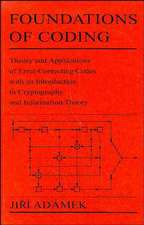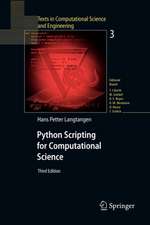Data-driven Modelling of Structured Populations: A Practical Guide to the Integral Projection Model: Lecture Notes on Mathematical Modelling in the Life Sciences
Autor Stephen P. Ellner, Dylan Z. Childs, Mark Reesen Limba Engleză Paperback – 24 mai 2016
Din seria Lecture Notes on Mathematical Modelling in the Life Sciences
-
 Preț: 340.61 lei
Preț: 340.61 lei - 15%
 Preț: 496.23 lei
Preț: 496.23 lei - 15%
 Preț: 703.85 lei
Preț: 703.85 lei - 15%
 Preț: 605.02 lei
Preț: 605.02 lei - 15%
 Preț: 422.82 lei
Preț: 422.82 lei - 15%
 Preț: 704.69 lei
Preț: 704.69 lei -
 Preț: 412.58 lei
Preț: 412.58 lei -
 Preț: 543.08 lei
Preț: 543.08 lei - 15%
 Preț: 655.77 lei
Preț: 655.77 lei - 15%
 Preț: 474.31 lei
Preț: 474.31 lei - 18%
 Preț: 784.48 lei
Preț: 784.48 lei -
 Preț: 389.70 lei
Preț: 389.70 lei - 15%
 Preț: 586.64 lei
Preț: 586.64 lei - 15%
 Preț: 519.32 lei
Preț: 519.32 lei - 15%
 Preț: 587.85 lei
Preț: 587.85 lei -
 Preț: 401.42 lei
Preț: 401.42 lei -
 Preț: 456.48 lei
Preț: 456.48 lei -
 Preț: 379.09 lei
Preț: 379.09 lei - 15%
 Preț: 635.84 lei
Preț: 635.84 lei
Preț: 643.95 lei
Preț vechi: 757.60 lei
-15% Nou
Puncte Express: 966
Preț estimativ în valută:
123.23€ • 133.81$ • 103.52£
123.23€ • 133.81$ • 103.52£
Carte tipărită la comandă
Livrare economică 22 aprilie-06 mai
Preluare comenzi: 021 569.72.76
Specificații
ISBN-13: 9783319288918
ISBN-10: 3319288911
Pagini: 330
Ilustrații: XIII, 329 p. 67 illus., 29 illus. in color.
Dimensiuni: 155 x 235 x 18 mm
Greutate: 5.21 kg
Ediția:1st ed. 2016
Editura: Springer International Publishing
Colecția Springer
Seria Lecture Notes on Mathematical Modelling in the Life Sciences
Locul publicării:Cham, Switzerland
ISBN-10: 3319288911
Pagini: 330
Ilustrații: XIII, 329 p. 67 illus., 29 illus. in color.
Dimensiuni: 155 x 235 x 18 mm
Greutate: 5.21 kg
Ediția:1st ed. 2016
Editura: Springer International Publishing
Colecția Springer
Seria Lecture Notes on Mathematical Modelling in the Life Sciences
Locul publicării:Cham, Switzerland
Public țintă
ResearchCuprins
Introduction.- Simple Deterministic IPM.- Basic Analysis 1: Demographic Measures and Events in the Life Cycle.- Basic Analysis 2: Prospective Perturbation Analysis.- Density Dependence.- General Deterministic IPM.- Environmental Stochasticity.- Spatial Models.- Evolutionary Demography.- Future Directions and Advanced Topics.
Notă biografică
Stephen Ellner is a Horace White Professor of EEB at Cornell University, Department of Ecology and Evolutionary Biology. His general interests are in theoretical population biology and evolutionary ecology.
Dylan Childs is an NERC Postdoctoral Fellow at the University of Sheffield. His key research interests include life history theory, evolutionary demography, structured population modeling, and host-parasite dynamics.
Mark Rees is a Professor in the Department of Animal and Plant Sciences at the University of Sheffield. His key research interests include evolution of plant reproductive strategies, modeling and management strategies for weed populations, population biology of invasive plants, and modeling structured populations using integral projection models.
Dylan Childs is an NERC Postdoctoral Fellow at the University of Sheffield. His key research interests include life history theory, evolutionary demography, structured population modeling, and host-parasite dynamics.
Mark Rees is a Professor in the Department of Animal and Plant Sciences at the University of Sheffield. His key research interests include evolution of plant reproductive strategies, modeling and management strategies for weed populations, population biology of invasive plants, and modeling structured populations using integral projection models.
Textul de pe ultima copertă
This book is a “How To” guide for modeling population dynamics using Integral Projection Models (IPM) starting from observational data. It is written by a leading research team in this area and includes code in the R language (in the text and online) to carry out all computations. The intended audience are ecologists, evolutionary biologists, and mathematical biologists interested in developing data-driven models for animal and plant populations. IPMs may seem hard as they involve integrals. The aim of this book is to demystify IPMs, so they become the model of choice for populations structured by size or other continuously varying traits. The book uses real examples of increasing complexity to show how the life-cycle of the study organism naturally leads to the appropriate statistical analysis, which leads directly to the IPM itself. A wide range of model types and analyses are presented, including model construction, computational methods, and the underlying theory, with the moretechnical material in Boxes and Appendices. Self-contained R code which replicates all of the figures and calculations within the text is available to readers on GitHub.
Stephen P. Ellner is Horace White Professor of Ecology and Evolutionary Biology at Cornell University, USA; Dylan Z. Childs is Lecturer and NERC Postdoctoral Fellow in the Department of Animal and Plant Sciences at The University of Sheffield, UK; Mark Rees is Professor in the Department of Animal and Plant Sciences at The University of Sheffield, UK.
Stephen P. Ellner is Horace White Professor of Ecology and Evolutionary Biology at Cornell University, USA; Dylan Z. Childs is Lecturer and NERC Postdoctoral Fellow in the Department of Animal and Plant Sciences at The University of Sheffield, UK; Mark Rees is Professor in the Department of Animal and Plant Sciences at The University of Sheffield, UK.
Caracteristici
The only comprehensive monograph on Integral Projection Models in ecology Accessible to beginners with minimal math and statistics background, but also includes cutting-edge research Presents a wide range of models, from simple to complex All steps are illustrated in the text by code in the open-source R language Complete code for all analyses and results provided online via GitHub Includes supplementary material: sn.pub/extras









